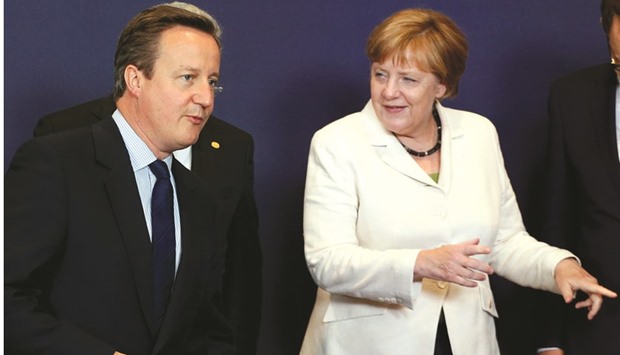European leaders yesterday told Britain to act quickly to resolve the political and economic chaos unleashed by its vote to leave the European Union, a move the IMF said could put pressure on global growth.
Financial markets recovered slightly after the result of last Thursday’s referendum wiped a record $3tn off global shares and sterling fell to its lowest level in 31 years, but trading was volatile and policymakers said they would take all necessary measures to protect their economies.
European countries are concerned about the impact of the uncertainty created by Britain’s vote to leave on the 27 other EU member states.
There is little idea of when, or even if, the country will formally declare it is quitting.
“The process for the United Kingdom to leave the European Union must start as soon as possible,” French President Francois Hollande said. “I can’t imagine any British government would not respect the choice of its own people.”
European Commission President Jean-Claude Juncker sent a similar message as he prepared for talks with British Prime Minister David Cameron before an EU summit in Brussels, although he did not anticipate an immediate move.
“We cannot be embroiled in lasting uncertainty,” Juncker said in a speech to the European Parliament, which he interrupted to ask British members of the assembly who campaigned to leave the EU why they were there.
Cameron, who called the referendum and tendered his resignation when it became clear he had failed to persuade Britain to stay in the EU, says he will leave it to his successor to formally declare the country’s exit.
Arriving for the EU summit, he said: “I’ll be explaining that Britain will be leaving the European Union but I want that process to be as constructive as possible, and I hope the outcome can be as constructive as possible.
Holding out hope of maintaining good relations with other European countries, he said Britain wanted “the closest possible relationship in terms of trade and co-operation and security. Because that is good for us and that is good for them.”
His party says it aims to choose a new leader by early September.
But those who campaigned for Britain’s leave vote have made clear they hope to negotiate a new deal for the country with the EU before triggering the formal exit process.
European leaders have said that is not an option. “No notification, no negotiation,” Juncker said.
After Cameron addressed EU leaders yesterday evening, they meet today to discuss Brexit without him.
German Chancellor Angela Merkel said Britain would not be able to “cherry-pick” parts of the EU, such as access to the single market, without accepting principles such as freedom of movement when it negotiates its exit from the bloc.
“I can only advise our British friends not to fool themselves...in terms of the necessary decisions that need to be made in Britain,” she told German parliament in Berlin.
Cameron will meet other European counterparts one-on-one before addressing them all at what promises to be a frosty dinner to discuss what has become known as Brexit.
EU lawmakers say they want him to trigger the exit process at the dinner, but an EU official said that was unrealistic given the political chaos in London, where both Cameron’s party and opposition Labour lawmakers are deeply divided.
The vote has caused new friction in the EU at a time of crises over a mass influx of refugees, economic weakness and tensions on its borders with Russia.
Poland’s foreign minister demanded Juncker and other leaders of the executive European Commission quit for not preserving the Union.
The prime minister of Greece, enduring austerity measures in return for aid, said Europe must change direction.
Germany’s financial market regulator delivered a double blow to London, saying it could not host the headquarters of a planned European stock exchange giant after Britain leaves the EU, and could not remain a centre for trading in euros.
Dutch Prime Minister Mark Rutte said England had collapsed “politically, monetarily, constitutionally and economically”.

British Prime Minister David Cameron and German Chancellor Angela Merkel take places for the traditional family photo at he EU summit in Brussels yesterday.
